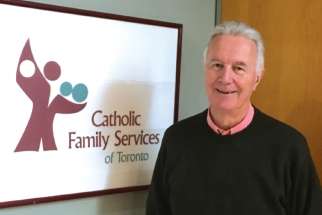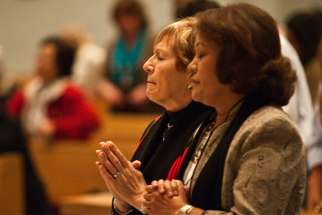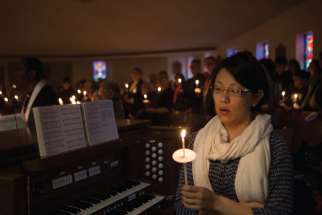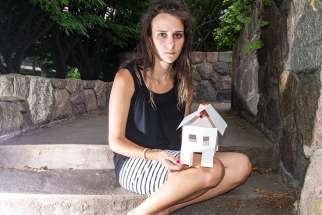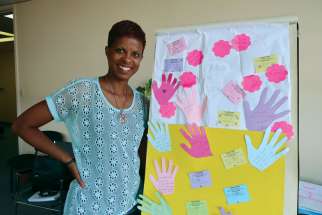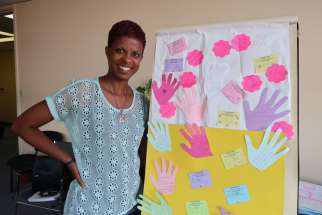Despite tumultuous times, support still flows
Amid the pandemic hardships of the past few years and a rapidly changing world since, Catholic Family Services (CFS) Toronto has maintained its unwavering support for those in need. Executive director Brenda Spitzer credits much of this resilience to the generous support of donors.
The people who work at Catholic Family Services of Toronto aren’t the sort who celebrate themselves. So when the social workers, counsellors and their support staff came together Nov. 17 to celebrate a century of work with the poor and the distressed of Toronto, they were there “because of the people we serve,” Catholic Family Services counsellor Dominique Lemelin told The Catholic Register.
Post-COVID reality hitting social services
COVID has been hard on families, but just how hard is only now coming to light, as society gradually opens up to a post-pandemic reality.
Scholarship honours pair who serve
Two social workers with Catholic Family Services of Simcoe County are the latest recipients of the annual Fr. Paul Lennon/Doreen Cullen Social Work Scholarship.
Taking on a new role in life comes with its challenges, but Brenda Spitzer steps into Catholic Family Services of Toronto with the knowledge she will be following along a steady path laid down by her predecessors for almost a century.
If Denis Costello can take anything away from more than a quarter century with Catholic Family Services Toronto, it’s knowing that the need for the agency has never been greater.
Mass to End Women Abuse sends strong message, CFS Toronto says
About one-third of the work at Catholic Family Services of Toronto starts with a woman who has been abused.
Family Services seeks long-term housing solutions
Teen workshops on the rise to combat dating violence
Carol Soares has conducted more workshops in the first few months of the Teens Healthy Relationships program than she had ever done in one school year.
It was a night filled with chatter and soft Christmas tunes, but with a very serious message about women abuse.
Teens program plants seeds of healthy relationships
TORONTO – High school is a formative time in a person’s life. For most people, it is when teens begin to make new friends and start dating.
TORONTO - A simple idea that has helped hundreds of women who face domestic violence and abuse is down to its last few weeks unless Ontario’s provincial government comes up with $70,000 per year to keep it going.
Family services to kickstart conversation on ‘terrible evil’
Cardinal Thomas Collins will meet and pray with faith leaders from across Toronto to start a more public conversation about violence against women in the spring of 2013.
Catholic Family Services is organizing the interfaith service, which Collins committed to attending in a message to the third annual Mass to End Woman Abuse celebrated at Blessed Trinity Church in Toronto Oct. 16.
Collins called violence against women a “terrible evil.”
“Often this happens out of the sight of the world, but those who experience it experience enormous grief and pain,” Collins wrote.
The idea that faith leaders are ready to publicly talk and pray about how women suffer at the hands of men is “a very good thing,” said Canadian Women’s Foundation president and CEO Bev Wybrow.
“What we would like to see come out of it is looking at the most effective ways to address violence in the context of faith communities,” Wybrow said. “That is very, very important to some women in particular and it hasn’t always been as appropriate as it should be.”
This year’s Mass to End Woman Abuse, organized by Catholic Family Service of Toronto, attracted about 200.
“I would want it to be standing room only,” said Kelly Bourke, who directs the Faith Connections youth program for the Sisters of St. Joseph of Toronto. “I find it challenging that it’s not.”
Though the Church may not be full, the annual event is giving a higher profile to the issue, said Virginia Koehler, director of Catholic Family Services woman abuse programs. With each Mass Catholic Family Services has seen an increase in referrals and volunteers.
“Priests are calling — priests we haven’t heard from,” she said.
The Mass particularly concentrates on thanking and honouring survivors of spousal abuse who volunteer as mentors in Catholic Family Services’ Women Helping Women program.
The impulse to keep silent about violence within marriages is exactly the cover abusers need, said Lucia Furgiuele, Catholic Family Services of Toronto executive director.
“We stand united in breaking the silence that accompanies this issue,” she said.
Women should never be told to be obedient and pray in the face of violence, said Furgiuele.
“Our Church teaches that women should leave abusive situations that persist,” she said.
Prayer is not irrelevant, said Wybrow.
“Prayer can be accompanied by concrete action as well and help make sure action is appropriate as possible,” she said.
Bringing safety to troubled marriages
BRAMPTON, ONT. - Catholic social workers in Brampton and Mississauga have found a new way to stand up for marriage by standing with as many allies as they can find.
Catholic Family Services Peel-Dufferin, a Catholic social work agency at the service of all families in the suburbs west of Toronto, is the lead agency for the Safe Centre of Peel, a family justice centre in the William G. Davis Centre for Families in Brampton.
“As Catholics, we can’t be afraid to lead,” said Mark Creedon, executive director of Peel-Dufferin Catholic Family Services.
Creedon has pulled together eight critical agencies that serve women and families faced with violence. Rather than being referred from one location to another to obtain housing, counselling, legal aid, medical advice, child care and more, at the Safe Centre it all happens in the same place. The idea is to deliver more effective and timely help and prevent women from giving up hope and returning to life with their abuser.
“Our purpose (at Catholic Family Services) is to preserve true marriages,” said Creedon. “If somebody goes into a marriage thinking his wife is his punching bag, well that’s not really a marriage.”
The Brampton Safe Centre isn’t the first Canadian family justice centre led by a Catholic agency. The former Catholic family services agency in Kitchener-Waterloo, now known as Mosaic, took the lead in establishing the Family Violence Project of Waterloo Region in 2006.
The idea of pooling and co-ordinating services to battered women in a single location started in San Diego, Calif., in 2002. Former City Attorney Casey Gwinn brought together police and social work agencies to form a united child abuse and domestic violence unit. To date, Gwinn’s National Family Justice Alliance has fostered and encouraged 80 family justice centres in the United States and 30 internationally from Amman, Jordan, to Sonora, Mexico.
“The fundamental issues are the same whether you’re in Canada, Mexico, Europe or anywhere else in the world,” Gwinn told The Catholic Register.
In the case of Canadian centres, having religious agencies lead the conglomerate of services is an advantage, he said.
“That spiritual care piece does make the Canadian model more vibrant. We struggle in the United States to get the spiritual care piece addressed in family justice centres,” he said.
Though it’s a Catholic agency that acts as landlord and instigator at the Safe Centre of Peel, the centre is able to connect clients with spiritual care for people of all faiths. The other agencies may not be Catholic, but they share values and a common purpose with Catholic Family Services, said Creedon.
“We’re dealing with excellent partner agencies that have great values which we share,” he said.
While Creedon has been able to get most of the critical services to buy in, he has struggled to get Peel Regional Police onside. The police are part of the Safe Centre’s steering committee and have worked out a protocol for getting victims from the Safe Centre to the police station. But they refuse to station officers already dedicated to domestic violence cases at the centre.
Peel Police claim their “best practice business model” involves working with the Safe Centre of Peel, but “does not involve the permanent stationing of officers within the facility,” Staff Sergeant Rob Higgs told The Catholic Register in an e-mail.
“It’s very shortsighted for law enforcement to say, ‘Oh, this isn’t really our thing,’ ” said Gwinn. “Law enforcement officers around the world are realizing they can’t do the job alone. They’re never going to arrest their way out of the problem.”
Peel Police responded to 2,042 criminal intimate relationship incidents in 2011 and another 6,554 verbal domestic occurrences. Overall, domestic calls in Peel have increased 13.99 per cent between 2008 and 2011, according to Higgs.
The more police come to the house and do no more than record the incident or negotiate temporary quiet, the more abusive men feel the law won’t touch them, said Gwinn.
“Empowered batterers are more likely to fight with police officers. Empowered batterers are more likely to kill police officers,” said Gwinn.
The repeat visits also cost taxpayers hundreds of thousands of dollars in police resources that don’t produce convictions, said Gwinn.
Creedon would like to persuade police to station officers at the Safe Centre, but for now hopes working effectively with police will convince the next chief to assign officers to the centre.
Getting this right is about much more than saving the police budget or getting more convictions. For Creedon, it’s about changing the direction for the next generation.
“One of the things we know about domestic violence is how much it is a generational thing,” he said. “So if you grow up in a family where your mother is getting abused — or it could be the father, but somebody is getting abused in that family — you are three times more likely to grow up to be an abuser or to be abused.”
Nationally the scale of the problem is immense. In 2007 there were more than 40,000 incidents of spousal violence reported to police, about 12 per cent of all police-reported violent crime in Canada, according to Statistics Canada. Women were the victims 83 per cent of the time.
“I totally believe there is something about being a Catholic family service agency that following the Catholic social justice values forces us to not walk away when we see tremendous injustice,” said Creedon.







